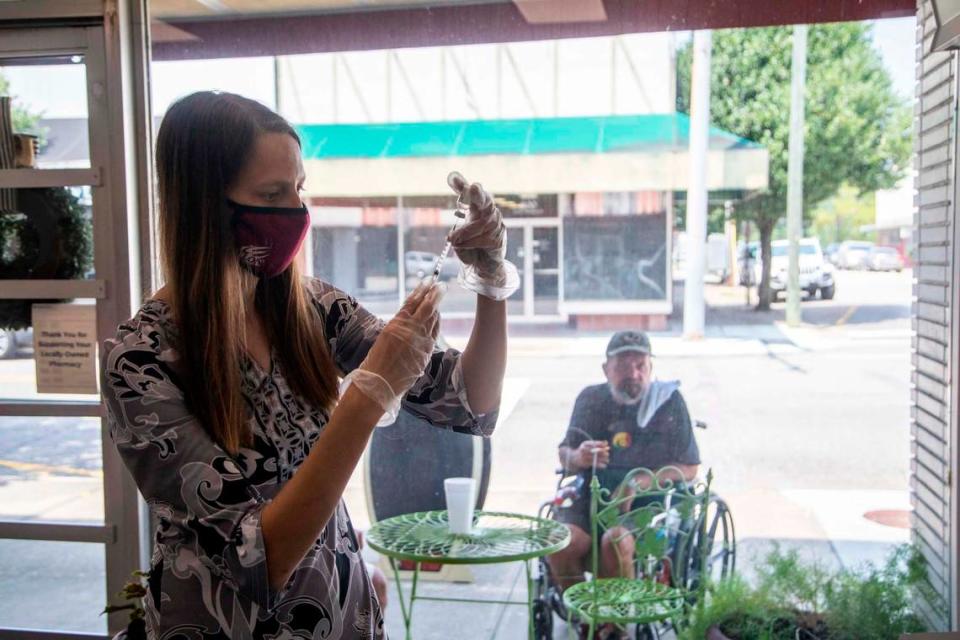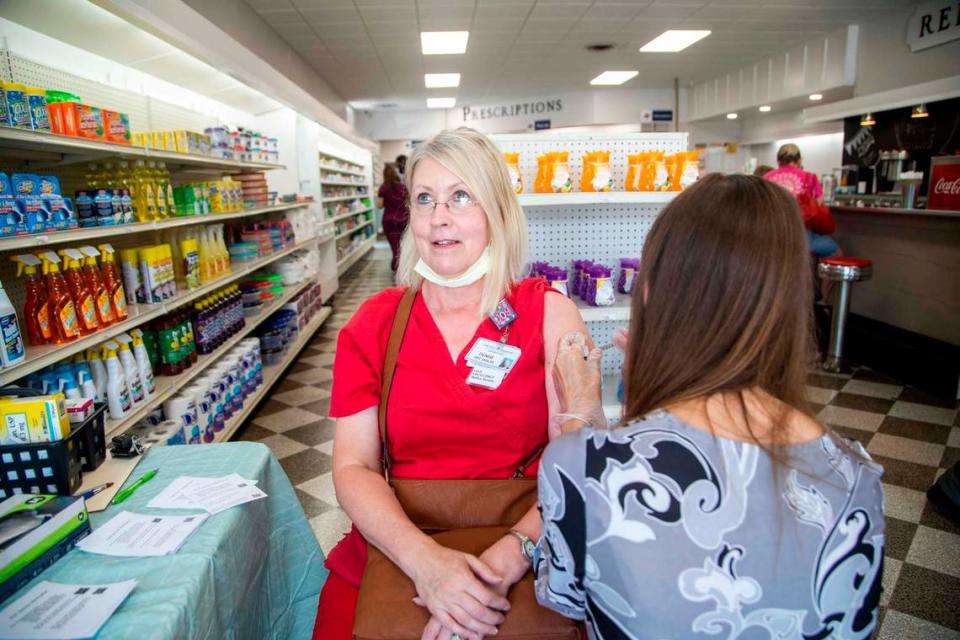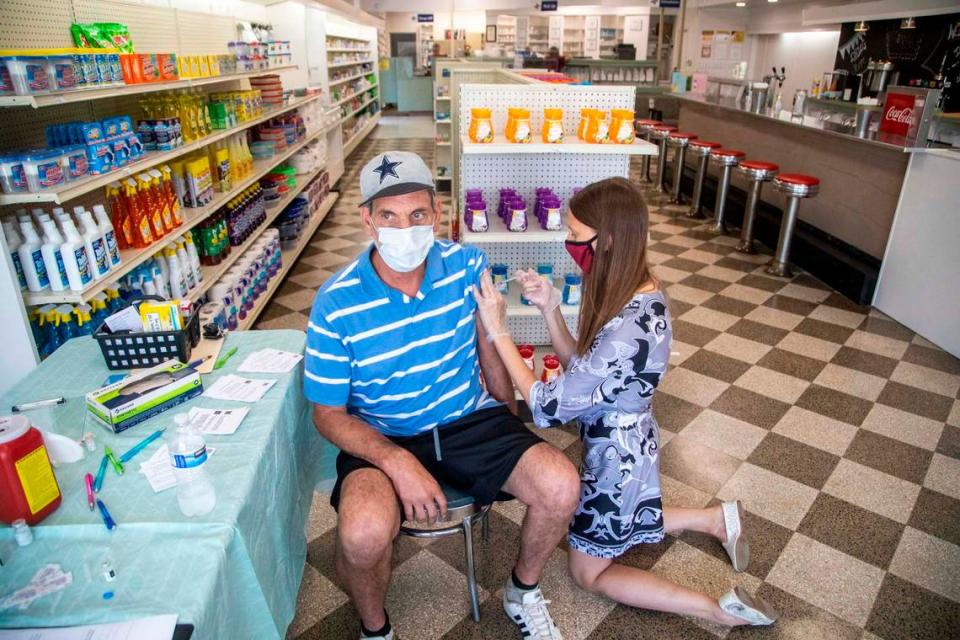In the NC county where the COVID rate is highest, vaccine acceptance is a slow struggle
For months, Earl Nealey laughed off COVID-19, resisting pressure to get vaccinated, telling the world protection doesn’t come from a syringe.
But his Whiteville pharmacist kept after him, and on Thursday, Angela Soles finally broke through Nealey’s stubborn hide. She arranged free vaccines inside Guiton’s Drug Store — a pharmacy so old-school it still serves orangeade at a soda fountain. And 30 seconds after Nealey sat down for his jab, he looked and asked, “That’s it?”
“I’ve got the Lord with me,” said Nealy, 59. “I ain’t worried about it. But everybody’s saying, if I did get it, I won’t end up on a respirator. So I’m here today and now everybody can leave me alone.”
Nealey’s shot was the 38th given at Guiton’s on Thursday, a triumphant dent in the pandemic considering that Columbus County owns the state’s highest rate for COVID-19 and one of the lowest for vaccinations.
Tucked in North Carolina’s southeast corner, Columbus reports 65 cases for every 10,000 residents, more than triple the rate in Wake, according to figures from the NC Department of Health and Human Services. Infections in neighboring counties are shooting up nearly as high. Robeson County’s rate stands at 52 per 10,000; Bladen’s, 53.

‘They don’t trust it’
But despite the pandemic’s resurgence and some blame cast by Gov. Roy Cooper, those counties remain firmly unvaccinated. Only 32% in Columbus County have taken both shots, slightly more than half the rate in Wake.
“Most of all, I hear they don’t trust it,” said Vickie Pait, a city councilwoman in Whiteville who also directs the town’s domestic violence shelter. “People who come into our office and are not vaccinated are proud of it.”
Pait and her staff all got shots as quickly as possible, but they found no camaraderie among the vaccinated. Rather, those few they know who did buck Columbus County’s trend ask them not to mention it.
“We don’t have a high education rate,” said Omar Godwin, a rape prevention counselor who works with Pait. “People rely on word of mouth. That’s not belittling them. It’s rural NC.”
Columbus County ranks among the state’s largest by size, but only 55,000 people call it home — roughly the same as Rocky Mount. Like many small North Carolina cities, Whiteville’s downtown is divided by railroad tracks, and most restaurants there take cash only.
The deaths from COVID-19 number 157 since the pandemic’s beginning, and even the vaccine skeptics have lost close family.
On a downtown Whiteville sidewalk, Polly Prevatte told the story of her sister’s quick demise, entering the hospital without symptoms and dying on a ventilator only a day later. She will never believe COVID-19 took her sister, despite medical explanations.
And though she will wear masks indoors, she said she will never take the vaccine.
“They say one thing then they tell you another,” she said, cigarette in hand. “I keep up with all that Fauci stuff. The mask wasn’t going to do good, then the mask was good. How do you know what to do? If they can’t say the truth about one thing, how do you know they’re telling the truth about the other? I’ve got friends say to me, ‘I got the COVID shot and still got COVID.’ Why get the shot?”

The anti-vaccine type
Inside Ed’s Grill, a downtown hot dog restaurant, few diners wear masks, though the staff mans the cash register, takes orders and cooks lunch with their faces covered. Ringing up a customer, Robert Strickland explains that he worked 20 years for the Columbus County Health Department before taking this job, and he knows the anti-vaccine type.
“They don’t want to listen to nobody,” he said. “Some people think the vaccine has some kind of chip in in it. I don’t know if it’s pride or what. They’re just not going to do it.”
At the health department, Director Kim Smith said she has held clinics in Whiteville, Riegelwood, Tabor City, Chadbourn and Fair Bluff — some of them until 8 p.m. Vaccinations at the clinic are down to one day a week — Friday — and roughly 30 people come.
“We’ve gone to homebound individuals,” Smith said. “We’ll go to different farms to get the migrant population. We’ve just found there’s a lot of political involvement. When it comes down to it, we can do the education. The individual is receptive to that or they say, ‘We still don’t trust you.’ That’s where we are.”

A pharmacy reaches out
At Guiton’s, Soles had never offered in-store vaccines, directing her customers to other sites instead. But then a youth baseball team came down with COVID infections and got disqualified from a state tournament, and she decided to push harder.
On Thursday, her pharmacy vaccinated Gary Wilson, a 65-year-old homeless man who travels the downtown streets in a wheelchair with his Jack Russell terrier, Blaze. Only a day before, Wilson said he had no transportation to a vaccine clinic.
“They told me they were doing free vaccines,” he said, bandage on his shoulder, “and I thought maybe I’d get one, being they were free.”
Plenty of people among the 38 said they just hadn’t found time to vaccinate until they saw Guiton’s sign. But as the clinic wrapped up Thursday afternoon, Soles found her greatest victory in her final patient, Earl Nealey.
A curmudgeon to the end, he trudged out the back door with the vaccine in his arm, pointing to Soles and promising, “If I get sick, I’m coming to your house.”
“I’ll call you tomorrow,” said Soles, smiling. “See how you’re doing.”

